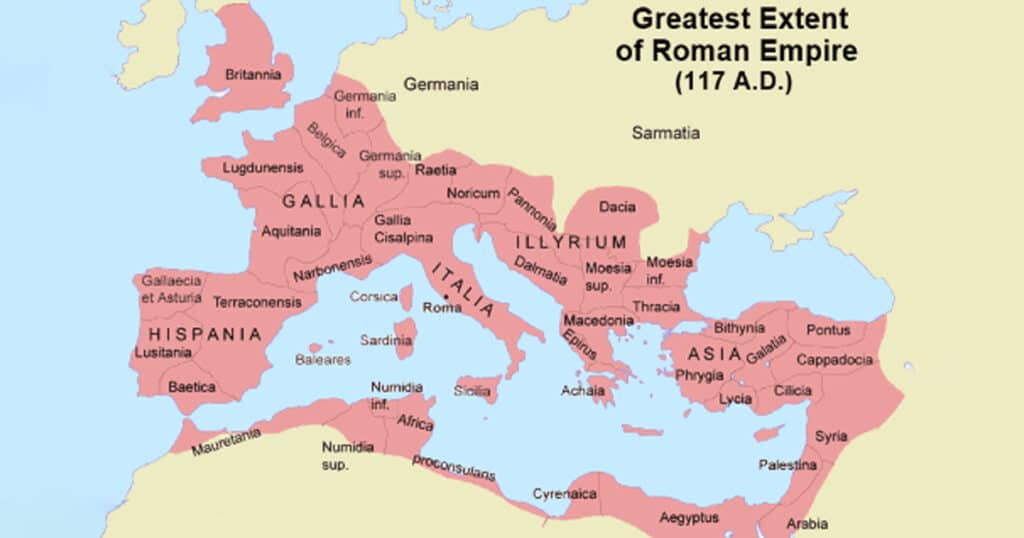
The Rise and Fall of the American Empire
In The Rise and Fall of the Roman Empire, Edward Gibbon outlines the life and death of what was arguably the greatest empire to ever exist. Rome, like most empires, consumed itself from within while there were plenty of enemies chipping away at the edges ready to pounce when the time was right. Time and space do not allow me to retrace the steps of what caused the fall of the Roman Empire, but having read the book, it is easy to find similarities between Rome then and the United States now.
First, what is an empire? Merriam-Webster’s dictionary uses the following: a. a major political unit having a territory of great extent or a number of territories or peoples under a single sovereign authority, or b. something resembling a political empire, especially an extensive territory or enterprise under single domination or control.[i]
There is no debate about whether Rome was an empire, but there is room to debate if The United States is one today. I believe the U.S. is an empire even though it does not resemble what people often think of when using the term. Here are a few reasons why I believe this.
- 1. We have 50 states and 14 territories spread across nine time zones.
- 2. We have approximately 750 known military bases in 80 countries or more. Add in the classified locations and those where other agencies of the U.S. Government exist and the number is north of one thousand.
- 3. We have Dozens of protectorates.
- 4. We are a military, economic, and cultural superpower.
This looks like an empire to me.
The average lifespan of empires throughout history is approximately two hundred and fifty years. Even with Rome being outside that norm, it is worth us thinking about the similarities between Rome and the U.S. Why? Because using either 1776 or 1784 (The Treaty of Paris) as a starting point for a two-hundred-and-fifty-year window you will arrive at either 2026 or 2034.
Is this great experiment in liberty based on the principles of our Constitutional Republic ending? I find the odds are greater than the average that “yes” is the answer.
First, let us look at a quick list of easily recognized primary factors that caused the downfall of the Roman Empire.
- 1. Declining morals and values.
- 2. Environmental problems, health decline, and the spread of disease.
- 3. Inflation.
- 4. Open borders.
- 5. Urban decay.
- 6. Cultural rot and identity loss.
- 7. Invasions.
- 8. Excessive military spending.
- 9. Political Corruption.
- 10. A decrease in civic virtue and the demonizing of masculinity.
Does any of this look familiar? It should. The odds are you were able to say “check” each time you progressed from one item to the next.
In America:
- 1. Inflation is rampant.
- 2. The border is wide open.
- 3. Cities are failing.
- 4. “E Pluribus Unum” is just “Pluribus”[ii] now (herein lies the loss of identity and culture).
- 5. We are invaded by way of the same open borders, cyber, balloons, bad ideas, and much more.
- 6. Military spending supports even those projects that work against the people of the U.S.
- 7. Political corruption, yep.
- 8. The continuous attempt to emasculate men and create a culture of weakness or wokeness.
But wait, there is more:
- 1. America’s strength is giving way to a rising East. Not only culturally, but economically as the global petrodollar fades.
- 2. There are many nations seeking to subvert the West while they align with the East.
- 3. We are selling our sovereignty to the highest bidder of those globalist organizations who seek to control access to food, water, shelter, markets, and medical support.
Those pursuing and supporting the Rise and Fall of the American Empire have moved from chipping away at our edges and are pouncing. Too often with our own cooperation. How can a nation survive such actions, much less an empire?
It is easy to see why those who do not study history are doomed to repeat it.
America must clean up its own house before we have the right to complain about our neighbors. We do not need all these military bases and overly expensive embassies. We do not need to help guard the border between North and South Korea or fund a border war between Russia and Ukraine while leaving ours open. The world is tired of us intervening and acting as if we occupy the moral high ground. Isolationism is not healthy, but we must reduce our global reach in a manageable way before it all comes crashing down.
I am a helicopter pilot, and in our community, we often talk about an emergency-controlled descent to a hard landing that can be survived because we still have some control. Or we can wait until there is an uncontrolled crash that nobody can survive because we did not act in time. I choose the hard landing that comes with making hard choices now before we crash our nation and add ourselves to the ash heap of history.
[i] https://www.merriam-webster.com/dictionary/empire
[ii] “Out of many, one” vs “Many”



